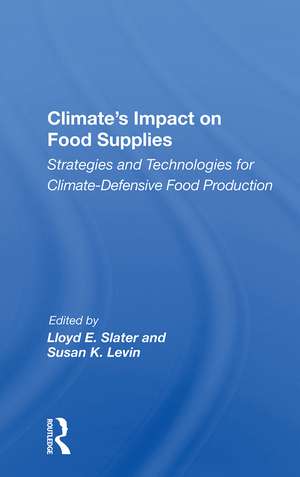Climate's Impact On Food Supplies: Strategies And Technologies For Climate- Defensive Food Production
Autor Lloyd E. Slateren Limba Engleză Hardback – 18 apr 2019
| Toate formatele și edițiile | Preț | Express |
|---|---|---|
| Paperback (1) | 258.63 lei 6-8 săpt. | |
| Taylor & Francis – 19 oct 2020 | 258.63 lei 6-8 săpt. | |
| Hardback (1) | 767.64 lei 6-8 săpt. | |
| Taylor & Francis – 18 apr 2019 | 767.64 lei 6-8 săpt. |
Preț: 767.64 lei
Preț vechi: 1104.80 lei
-31% Nou
Puncte Express: 1151
Preț estimativ în valută:
146.93€ • 159.66$ • 123.50£
146.93€ • 159.66$ • 123.50£
Carte tipărită la comandă
Livrare economică 21 aprilie-05 mai
Preluare comenzi: 021 569.72.76
Specificații
ISBN-13: 9780367018771
ISBN-10: 0367018772
Pagini: 264
Dimensiuni: 146 x 229 mm
Greutate: 0.64 kg
Ediția:1
Editura: Taylor & Francis
Colecția Routledge
Locul publicării:Oxford, United Kingdom
ISBN-10: 0367018772
Pagini: 264
Dimensiuni: 146 x 229 mm
Greutate: 0.64 kg
Ediția:1
Editura: Taylor & Francis
Colecția Routledge
Locul publicării:Oxford, United Kingdom
Cuprins
About the Series -- Introduction -- Viewing the Climate/Food Interaction -- Climate's Impact on Food Supplies: Can It Be Identified? -- Climate, Food and Society -- Uses of Climatic Knowledge in the Food Systems of Developing Countries -- Climate–Defensive Policies to Assure Food Supplies -- Botswana's Food: A Case of Livestock versus Climate -- Case Studies of the Multinational Corporation as a Food/Climate Buffer -- Reducing Climate's Impact -- Three Approaches to Reducing Climate's Impact on Food Supplies -- The Promise of Food and Climate Information Systems -- A Microecological View of Arid Land Agriculture -- Technologies and Strategies in Weatherproofing Crop Production -- New Options for Climate-Defensive Food Production -- Synthetic Foods: Eliminating the Climate Factor
Descriere
This book assesses theories of how climate influences food production and distribution, discusses how societies can contend with climate-induced food shortfalls, and explores policies and technologies that promise to reduce climate's impact on agriculture and to increase food production through unorthodox methods.
